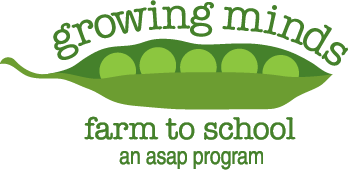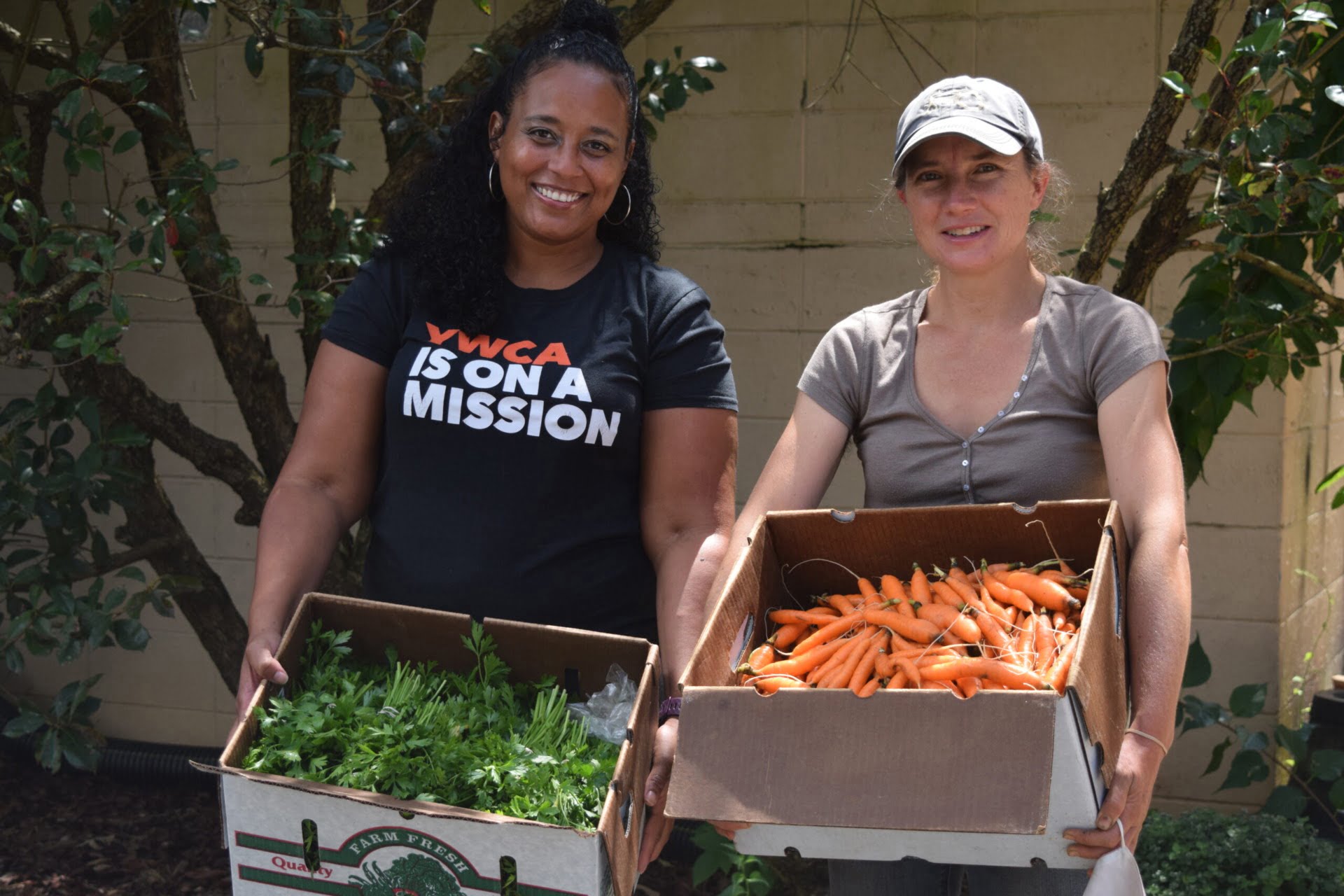Melinda Aponte is the nutrition coordinator for the YWCA of Asheville’s Early Learning Program. The YWCA is part of ASAP’s Appalachian Farms Feeding Families program, working with Ivy Creek Family Farm to provide fresh, local produce for the children. She is pictured on the left with farmer Anna Littman of Ivy Creek.
What are some examples of farm to cafeteria activities you have participated in with the students?
Pre-COVID we’ve always done Farmers Market Friday, which is a huge part of my nutrition program. I go to each classroom and introduce different veggies and fruits in their natural state, uncooked, so the children get familiar. I find it so much easier to work with children. They’re so much more adventurous than adults, especially when their friends are trying it. I ask them, “What does it taste like? What are the colors?” I want to get them involved. The more you allow them to make it their own, the more they’re open to new flavors.
Why do you think it’s important for children and families to be connected to local food and farms?
Why isn’t it? That’s the question. Teaching children about food goes hand in hand with the mission of the YWCA: “Eliminating Racism, Empowering Women, and Promoting Peace, Justice, Freedom, and Dignity for All.” But in addition to that, with local food we’re bringing down our carbon footprint and giving these kids more nutritional bang for their buck by eating local and seasonal food. Fresh vegetables and fruit provide a foundation to promote lifelong health and wellness.
How has your role as Nutrition Coordinator changed the food environment at your school?
It changed drastically. I’ve been here six years now. My background is as a chef in New York and also in the private school sector. When I came to the YWCA, a lot of food was canned. Now we do almost everything from scratch, which was a great evolution. Also, I teach the people I work with to take ownership of what they make for the children. We look at it as if we are feeding our own children. With cooks, when you’re having a good day, that same sandwich that you’ve made a thousand times, it’s the best ever. I want our staff to be conscious of the energy we put into the food. What we do here is intentional. Everything we do matters. We’re an integral part of the children’s learning experience.
Can you talk about how your relationship with Ivy Creek Family Farm has developed through the Appalachian Farms Feeding Families program?
Before COVID I was trying to connect with local farmers, then COVID happened and that disappeared. I was so excited when I got the email from ASAP and was connected with Anna [Littman of Ivy Creek Family Farm]. It’s just been fantastic. By working with a farmer over time, seeing the farmer, you get that personal connection. They understand what you are cooking, for how many, and what are your future goals. You understand what they’ve planted when it’s going to be in season. That communication is huge. I get to talk to Anna when she delivers. I love to tell her what we’re making. I told her I wasn’t going to throw out those beautiful beet greens—no I’m sautéing those bad boys. I use every part of the vegetable that’s edible because I want the children to have the most nutritious meals. Some of these children don’t have access to these veggies at home. It just fills my heart to know that the meals we provide are excellent.
What local produce are you getting right now and what types of recipes do you make for the students?
Right now our bounty is lots of leafy greens. We’re sautéing greens, making soups, and making pesto. Anna brought me a huge amount of greens. She wasn’t sure if we could use all of it, but it was gone in two days. The children eat everything we send.
Can you share a favorite experience with us?
In addition to our Early Learning Program, we also offer Empowerment Childcare, and a lot of those babies are experiencing homelessness, have parents in school, or could be transitioning from foster care. We overheard one parent ask, “What did you do today?” “We had veggies. They were green and they tasted good.” My co-worker and I just looked at each other like, “Did she really just say that?” My co-worker started crying. We knew what that meant. We’re accomplishing what we set out to do.

